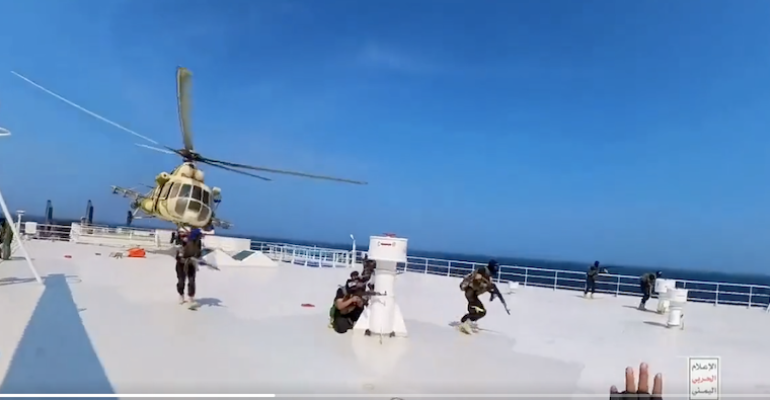Here is a question for policy makers, international agencies, ministers of trade, transport and naval strategists. Is it even remotely acceptable that the peaceful passage of merchant ships through one of the world’s most important international sea routes should be subjected to attacks by heavily armed rebel forces controlling the shores they are passing?
Should international shipping tolerate for a minute the threat that if their ownership is not acceptable to those controlling the coast, or if ships are bound to and from the ports of Israel, such ships will be attacked? And why should innocent seafarers, undertaking their regular and essential work, be put at fear of their lives, or become hostages to those whom, in more enlightened days, would be termed pirates?
One can understand the wish of diplomats and anxious internationalists to avoid any escalation of the conflict in Gaza which has occasioned the attacks in the Gulf of Aden and the Red Sea, but it is important that they realise exactly what is at stake here and why it is unacceptable that a major trade route should be hazarded in this fashion. We had a brief reminder of the importance of this sea route, when it was briefly interrupted by the grounding of the Ever Given in the Suez Canal.
The threat of turning the whole Red Sea into a “no-go” area for merchant ships really ought to convince everyone that more than strong words and diplomatic protests are required.
Ultimately, the movement of Gulf oil and gas, the China and Far East-Europe trade routes, those to Australasia and the Sub-Continent and more, are all at risk, from higher insurance costs, war risk bonuses, and far worse, in the event that a Houthi missile or drone gets through and causes substantial damage or loss of life aboard a large ship.
The Suez Canal, and the very prosperity of Egypt which depends so much on the waterway, are threatened. And if the Houthis and their Iranian paymasters believe that they can attack shipping without any retaliation, why will they restrict their attacks to ships which may, or may not, have some tenuous connection with the State of Israel? Who provides them with the intelligence that enables them to discriminate between one ship and another by somehow exploring the detail of its beneficial ownership?
The success of coalition warships in intercepting various missiles and drones may be a good illustration of naval technology, but does nothing to deter those firing these weapons in the first place.
It is concerning in the extreme that the multi-national crew seized with the car carrier Galaxy Leader last month remain, along with their ship, as hostages. Can a repetition of such an outrage be prevented, bearing in mind the speed and efficacy of the helicopter-borne attack? Will the passage of international ships through this vital sea area ultimately have to depend upon close protection by warships, in convoys; a defensive strategy, that does nothing to remove the ongoing threat?
It is curious that in this enlightened and internationalist century, we are facing the sort of threats to the safe passage of merchant ships which would have been familiar to seafarers and shipping people in earlier ages. It is a stark reminder, one might suppose, of why naval
expenditure is necessary, despite the siren calls of those who would rather their money was spent on more peaceful purposes. One might argue whether the interception of incoming or passing missiles and drones is merely preventative and precautionary, or if the costs could be better defrayed by ensuring that those firing the missiles are permanently dissuaded from their hostile behaviour.
Does history tell us anything about the best strategy to adopt when shipping and trade is so threatened? In 1804, the very first international action by the new navy of the United States, when the squadron of Commodore Edward Preble destroyed the capability of the Barbary pirates who had long been menacing shipping in the Mediterranean, offers a tempting precedent.
Copyright © 2024. All rights reserved. Seatrade, a trading name of Informa Markets (UK) Limited.
Add Seatrade Maritime News to your Google News feed.  |

